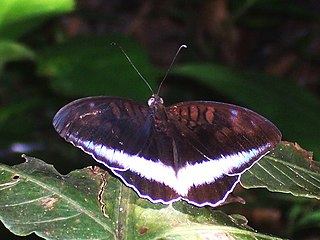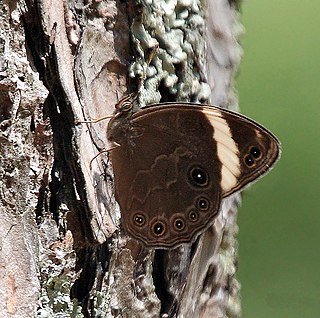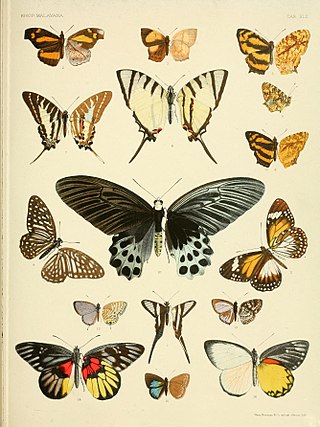
The Limenitidinae are a subfamily of butterflies that includes the admirals and relatives. The common names of many species and genera reference military ranks or – namely the Adoliadini – titles of nobility, in reference to these butterflies' large size, bold patterns, and dashing flight. In particular, the light stripe running lengthwise across the wings of many Limenitidini has reminded earlier authors of officers' shoulder marks and epaulets.

Lethe is a genus of butterflies in the subfamily Satyrinae of the family Nymphalidae. The genus was erected by Jacob Hübner in 1819. It includes the treebrowns, woodbrowns, foresters and their relatives. The species in the genus Lethe occur in temperate-tropical southern and eastern Asia, up to Indonesia and in North America.

Symbrenthia lilaea, the peninsular jester, is a species of nymphalid butterfly found in South Asia and Southeast Asia. It forms a superspecies with Symbrenthia hippoclus. There are numerous regional forms in a poorly resolved taxonomy.

Nymphalini is a tribe of nymphalid brush-footed butterflies. Common names include admirals, anglewings, commas, and tortoiseshells, but none of these is specific to one particular genus.

Euthalia is a genus of brush-footed butterflies. They are commonly called barons or dukes.

Mycalesis, the bushbrowns, are a genus of brush-footed butterflies. They are common in the warm regions from Central Asia to Australia, and have a high diversity in South Asia and the Wallacea.

Athyma is a genus of brush-footed butterflies. They are commonly known as the "true" or "typical" sergeants, to distinguish them from the false sergeants of the genus Pseudathyma, a fairly close relative from the Adoliadini tribe. The genus ranges from Tibet to the Solomon Islands, but does not occur in New Guinea or Australia.
A jester is a type of entertainer employed by the nobility during the Middle Ages and the Renaissance.

Neptis is a large genus of butterflies of Old World tropics and subtropics. They are commonly called sailer butterflies or sailers, or more precisely typical sailers to distinguish them from the related blue sailer (Pseudoneptis).

Hydrelia is a genus of moths in the family Geometridae erected by Jacob Hübner in 1825.

Pseudochazara is a genus of butterflies within the family Nymphalidae.

Pantoporia is a genus of Asian butterflies sometimes called the lascars. They are predominantly with striped patterns of orange and black.

Symbrenthia hypatia is an Indomalayan nyphaline butterfly found in Thailand, Peninsular Malaya, Java, Sumatra, Borneo and the Philippines.

Hyponephele is a genus of butterflies of the subfamily Satyrinae in the family Nymphalidae. Most range from Europe into central Asia with a few in northern Africa. They are commonly called meadowbrowns.













